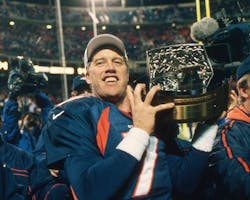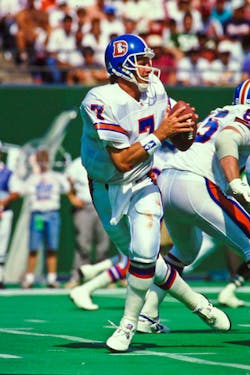In 1999, John Elway passed up a "sweet deal" for a 20% stake in the Broncos franchise—now valued at $2 billion. But was it really a mistake...like ESPN and others thought it was? Not necessarily so, says Reese Harper, CFP. Here's what markets—and Elway's story—can teach dentists about investing and building personal wealth.
This isn’t a story about football. Although, I probably wouldn’t have chosen this subject were it not for the Denver Broncos football my uncle gave me on my seventh birthday. That was the day I pledged my allegiance to the blue and orange. And even though the Broncos happen to be the reigning Super Bowl champs, fanhood hasn’t always been easy.
One of my earliest football memories is of my hero, John Elway, leading the Broncos to the Super Bowl...only to get blown out by the 49ers. That was on the heels of two other Super Bowl losses in the late eighties.
Redemption eventually came in the last two seasons of Elway’s hall-of-fame career when, with the help of star running back Terrell Davis, he led the Broncos to two straight Super Bowl victories. Some of you probably even remember Elway’s infamous “helicopter dive” where he spun his way to a first down that set up the game-winning touchdown against the Packers. But this isn’t a story about football.
This is a story about investing, and it begins in the same year Elway announced his retirement in 1999. As ESPN reports, the owner of the Broncos, Pat Bowlen, offered Elway a 20% stake in his franchise. Elway could buy 10% of the team for $15 million, and another 10% by foregoing a deferred salary of $21 million and becoming a special assistant to Bowlen.
What made the deal even sweeter for Elway was that if he wasn’t happy with the investment, he could sell back his stake two to five years later for $5 million more than his original purchase price plus 8% interest a year. On top of that, he would have first right of refusal to buy any other stake in the team if the Bowlen family wanted to sell to an outside party.
But Elway let the offer expire in June of 1999, and instead he pursued a series of private investment opportunities—mostly tech startups, with a Ponzi scheme thrown in—that didn’t pan out.
Before last year’s Super Bowl, ESPN published an article titled “How John Elway Missed Out on a Fortune” and used a recent Broncos valuation of nearly $2 billion to calculate a would-be return of 646% had Elway taken the deal.
Should Elway have taken the deal? It sure seems that way; especially after you read the article by ESPN. But I’m skeptical when authors use “total return” quotes like 646%. So I took some time to figure out if Elway really did miss out on the deal of a lifetime.
Based on the numbers provided, it looks like Elway would have achieved an annual return of 15 to 17%. That’s a very good return, especially when compared to the outcomes of Elway’s other investments. So it appears that he should have taken the deal. But before we make the final call, let’s take a look behind door number three.
I calculated the average annual return of all companies in the U.S. that were similar in size to the Broncos. Groups of companies like this are called small caps, or small companies. For this exercise I used a small cap value index, which measures returns of companies valued between $300 million and $2 billion (very similar to the Broncos valuation over this time period). The return on an index of this kind over the same period would have been around 13.5-14.5% annually—a percentage point or two shy of the estimated return on the Broncos.
Based on my findings, ownership in the Broncos would have put Elway one or two percentage points ahead of a small cap index investment. Now, here’s my response:
First, a small cap value index demands essentially no effort on the part of the investor. As opposed to joining the executive team of an NFL franchise and committing personal time and energy to business operations, a small cap stock index investment is entirely passive. If you add up the time Elway would have committed to the Broncos over sixteen years, you’re talking 4,160 days or 46,592 hours. Investing in a small cap index, on the other hand, requires no emotional or mental energy.
As entrepreneurs, dentists understand the pressure of running a practice. Would you rather take a 13.5% to 14.5% return for doing nothing, or expend a large portion of your time and energy for a higher return of 15% to 17%?
Second, small cap index funds are diversified across thousands of small businesses, allowing investors to benefit from market efficiencies. If you own an NFL franchise, all it takes is one injury, a losing season, or a string of bad luck to hurt your valuation. Take the Buffalo Bills, for example, who went to four straight Super Bowls in the early nineties. Since then they’ve only had five winning seasons. From 2002 to 2015, the annualized return on the Bills would have been much lower. As of today, they currently have the lowest valuation in the league.
Investments concentrated in one country, company, or sector may rise or fall within a given time period. However, markets as a whole have always overcome short term volatility and experienced growth in the long run. As long as your portfolio is spread across a broad range of investments to reflect the diversity of the global marketplace, history has shown that your money will grow over time.
Finally, unlike an NFL franchise or private sector business, the money invested in publicly-traded stocks is liquid—you can cash out anytime. An investment portfolio like this provides instant access to cash, greater flexibility, and more peace of mind. Most private companies, including NFL franchises, are not easy to liquidate, especially in incremental quantities. If John Elway had ownership in the Broncos and needed $250,000 for a remodel on his house, he couldn’t just sell a minority stake in the Broncos without going through months of red tape and negotiations.
This article isn’t meant to be a promotion for small cap value stocks. I’m certainly not advocating for anyone to put their investments all in one place. The point is that what appears to be a killer return might not be any better than a boring old investment that grows over time in a public stock exchange.
Because dentists are among the top earners in the country, most will have an opportunity to invest excess cash in a number of ways. And some of those ways will be incredibly tempting. Just remember that because of your sizable income, your money doesn’t need to grow beyond standard returns. You’re in a great position to play it safe and allow the market to work for you.
You should take two things away from the John Elway story:
1. Don’t just look at a number in a vacuum and decide if it’s good or bad. Numbers are only useful when they are put into context.
2. Before you put your money into a high-risk opportunity, make sure you have accumulated at least 30 times your annual spending. That’s enough to support you through retirement, and once you’ve arrived at this benchmark, you can feel safe going for a home run (or touchdown).
There’s a case to be made that ownership in an NFL franchise has, aside from money, plenty of intangible benefits like association with world-class athletes, a sense of purpose, a luxury suite at the top of the stadium, fame, and fun. But from a purely financial perspective, if it were 1999 and you were John Elway, would you take the deal? I’m not so sure I would.
MORE FROM REESE HARPER:
Top 10 mistakes dentists make on their way to retirement
What do James Bond and dentists have in common?
5 reasons why dentists have a love-hate relationship with money
How much money do you need to retire from dental practice?
7 key questions dentists should ask before hiring a financial advisor









